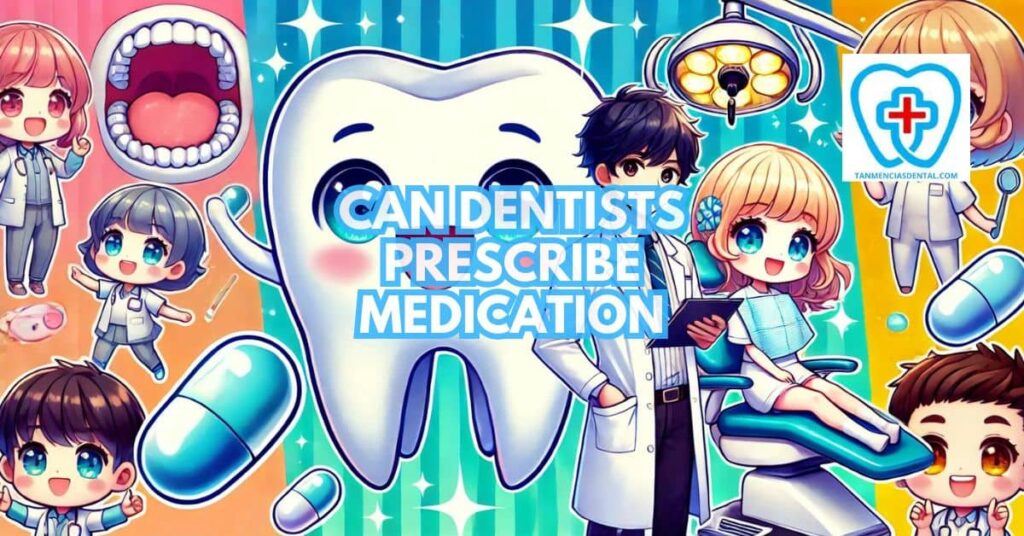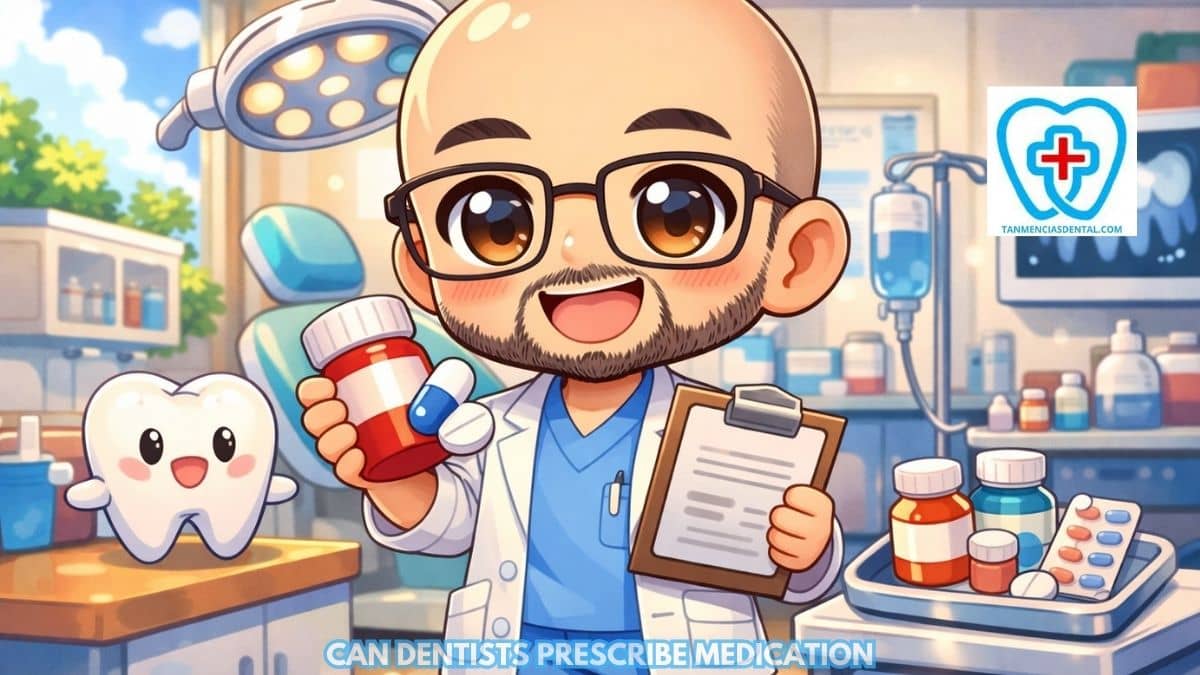Many patients ask a simple but important question: Can dentists prescribe medication?
The answer depends on the situation.
We’ll explain how dentists use prescriptions to treat oral health problems like infections, swelling, and pain.
At the same time, clear limits guide what dentists are allowed to prescribe and what falls outside their role.
Some medications are safe and appropriate for dental care, while others require a physician’s involvement.
We’ll cover how dental prescriptions work, why antibiotics are not always needed, and when medical care becomes necessary.
Understanding these boundaries helps patients make informed decisions and receive the right treatment at the right time.
1. What Are Dental Prescriptions?
Dental prescriptions are medications that dentists use to treat problems in the mouth, teeth, and gums.
These medicines help manage infections, swelling, and pain that come from dental conditions.
Common examples include antibiotics, pain relievers, and antiseptic rinses that support healing and comfort.
Dental prescriptions are a regular part of care and often help patients recover after procedures or manage ongoing oral issues.
Each medication is closely tied to the practice of dentistry and the dentist’s training in oral health.
Dentists choose these drugs based on the patient’s needs, medical history, and the condition being treated.
This careful approach helps ensure treatment is safe, effective, and focused on oral health.
🦷 How Can I Prevent Tooth Sensitivity When Eating Hot or Cold Foods?
2. Medications Dentists Can Prescribe
Dentists have the authority to prescribe a variety of medications, but only for oral health-related conditions.
Commonly prescribed drugs include antibiotics like penicillin or amoxicillin to combat infections, as well as pain relievers such as ibuprofen and acetaminophen.
Dentists may also prescribe corticosteroids to reduce inflammation in cases of severe gum disease.
In addition to medications for acute problems, dentists can also prescribe long-term treatments, such as fluoride tablets to strengthen teeth.
Each medication is chosen to address a specific aspect of oral health and to support recovery or ongoing care.
🦷 Discover the Benefits of Electric Toothbrushes
3. Understanding Regulations and Licensing for Dental Prescriptions
Dentists are regulated by licensing boards that clearly define what medications they are allowed to prescribe.
These rules limit prescriptions to drugs that are directly related to dental and oral health conditions.
In some cases, a dentist must complete additional steps to prescribe certain medications, especially when they involve a higher risk.
For example, a dentist must register with the proper authorities before prescribing controlled substances used for pain management.
This requirement helps track how these medications are used and reduces the risk of misuse.
Licensing boards also require dentists to follow strict standards when writing and managing prescriptions.
While the exact rules may vary by region, the main goal is always to protect patient safety.
Dentists receive focused training on dental medications so they can choose the right treatment.
These safeguards ensure dentists stay within their professional role while providing effective care.
🦷 Can Dentists Prescribe Antibiotics? Understanding the Scope of Dental Prescriptions
4. Common Dental Conditions and Their Medications
Dentists often treat common problems such as tooth infections, gum disease, and pain after dental procedures.
Many of these conditions require medication that is directly related to dental treatment and supports healing.
For bacterial infections, dentists may prescribe antibiotics like amoxicillin or clindamycin to control the spread of bacteria.
Pain relief is also important, and dental medication such as ibuprofen is often used to reduce swelling and discomfort.
In certain situations, stronger prescription pain medicine may be needed for a short time after extractions or surgery.
Dentists also use antiseptic mouth rinses to lower plaque levels and help prevent gum infections.
Each dentist medication is chosen based on the patient’s condition and overall health.
These treatments can address sudden problems as well as long-term dental issues.
When used correctly, dental medication helps improve comfort and allows the mouth to heal properly.
🦷 Is an Electric Toothbrush Significantly Better Than A Manual One?

5. When Dentists Should Not Prescribe Antibiotics
Antibiotics are not always the right treatment for dental pain, even when the discomfort feels severe.
Many toothaches, such as pain caused by nerve damage inside the tooth, require dental procedures instead of medication.
In these cases, antibiotics cannot fix the problem because there is no active bacterial infection to treat.
Dentists usually prescribe antibiotics only when an infection is spreading, causing swelling, fever, or other signs that affect the whole body.
Using antibiotics when they are not needed can lead to unwanted side effects, including stomach problems and allergic reactions.
Overuse also makes bacteria stronger and harder to treat in the future.
By prescribing antibiotics only when necessary, dentists help protect both the patient’s health and the effectiveness of these medicines.
🦷 Overcoming the Fear of Brushing Your Teeth
6. Limits on Dental Prescribing: What Dentists Can’t Do
Dentists are limited to prescribing medications that treat problems in the mouth, teeth, and gums.
This means dentists can only prescribe drugs that are directly tied to dental care and oral health needs.
They cannot write prescriptions for medical conditions that affect other parts of the body, such as diabetes, asthma, or heart disease.
Medications for mental health, hormone balance, or long-term medical care also fall outside a dentist’s role.
These limits help keep treatment safe and appropriate for each patient.
By staying within this scope, dentists focus on what they are trained to treat.
This clear separation of roles protects patients and ensures they receive care from the right health professional.
🦷 What Are The First Signs Of A Cavity That I Should Look For
7. When to See a Physician for Medication Needs
There are situations where a patient needs to see a physician instead of relying on a dentist for medication.
If a condition involves the entire body, like a systemic infection, or if it’s unrelated to dental health, a physician is the appropriate professional to consult.
As an example, if a dental infection spreads beyond the mouth, a doctor may need to prescribe a broader treatment.
Patients with chronic illnesses, such as hypertension, should also consult their physician for medication management.
This separation of roles ensures patients receive the right care for their specific health issues.
🦷 What to Consider When Choosing Dental Clinic Name Ideas: Avoiding Common Pitfalls
8. Ensuring Patient Safety with Dental Prescriptions
Patient safety is a top priority when dentists prescribe medications, as they must consider each patient’s unique health history.
Before prescribing, dentists assess factors such as drug allergies, interactions with existing medications, and underlying medical conditions.
Dentists also avoid overprescribing antibiotics to prevent resistance and ensure the appropriate medication is chosen for each case.
In some instances, they may consult with a physician to ensure the prescription is safe for the patient.
This careful approach helps minimize risks and ensures that the patient receives the most effective treatment without complications.
🦷 Why Is Flossing Necessary If I Already Brush Twice A Day?
9. The Importance of Collaborative Care Between Dentists and Physicians
Collaboration between dentists and physicians is often necessary for patients with complex health needs.
For instance, patients with heart conditions, diabetes, or compromised immune systems may require a physician’s input before receiving certain dental treatments or prescriptions.
Dentists may consult with a physician to ensure medications don’t conflict with the patient’s overall health plan.
This collaborative care is especially important when managing infections that could affect the body beyond the mouth.
By working together, dentists and doctors can provide safer and more comprehensive treatment for patients.
🦷 Broken Tooth Fix At Home: Top Tips for Immediate Relief Before Seeing a Dentist
10. Educating Patients About Their Dental Prescriptions
Patients need clear guidance on how to use the medications their dentist prescribes.
Dentists explain the correct dose, how often to take the medicine, and how long treatment should last.
They also review possible side effects so patients know what to watch for.
When dentists dispense drugs or provide prescriptions, they stress the importance of following instructions exactly as given.
Patients are advised to avoid certain foods, activities, or other medicines that could interfere with treatment.
This education helps prevent mistakes that may reduce the medicine’s effect or cause harm.
Well-informed patients are more likely to heal properly and achieve better dental results.
🦷 Dental Diagnostics In Marikina
11. Future Trends in Dental Prescribing Practices
Advances in dental care may bring about changes in how dentists prescribe medications.
Personalized medicine, such as using a patient’s genetic information to tailor prescriptions, could become more common in dental care.
Telemedicine may also expand, allowing dentists to prescribe medication through remote consultations.
Moreover, there may be new medications specifically designed for faster healing or better management of chronic oral health conditions.
These trends could enhance the effectiveness and convenience of dental prescriptions in the future.
🦷 Full Dental Care in Marikina
👨⚕️ Conclusion
Dentists play an important role in managing oral health through the medications they prescribe, but they must work within clearly defined limits.
While they can prescribe antibiotics, pain relievers, and other oral health medications, they are restricted from treating non-dental conditions.
Collaboration with physicians is often necessary to ensure that treatments align with a patient’s overall health needs.
Understanding these boundaries helps patients get the right care while maintaining safety.
Dental prescriptions, when used properly, are a vital part of maintaining good oral health.
❔ FAQs
1. Can dentists prescribe medication for tooth pain?
Yes, dentists can prescribe medication to manage tooth pain when it is related to a dental problem.
This often includes pain relievers or anti-inflammatory drugs after procedures like extractions.
However, medication alone may not fix the cause of the pain.
In many cases, a dental procedure is still needed to treat the problem properly.
2. Can a dentist prescribe antibiotics without doing a procedure first?
Dentists may prescribe antibiotics when there are clear signs of infection, such as swelling, fever, or spreading pain.
Antibiotics are not used for all toothaches, especially when no infection is present.
In many cases, treating the tooth directly is more effective than medication alone.
Dentists decide based on symptoms and the condition of the mouth.
3. Can dentists refill prescriptions from another dentist or doctor?
Dentists usually do not refill prescriptions unless the medication is related to the dental care they are providing.
If the original prescription came from a physician or was for a medical condition, a dentist will refer the patient back to that doctor.
This helps prevent misuse and ensures proper care.
Each provider manages prescriptions within their own scope.
4. Are dental prescriptions safe for people with medical conditions?
Dental prescriptions can be safe for patients with medical conditions, but extra care is required.
Dentists review health history, current medications, and allergies before prescribing.
At times, they may consult a physician to avoid harmful interactions.
This process helps reduce risks and protect patient safety.
5. What should patients tell their dentist before getting a prescription?
Patients should tell their dentist about all medications they take, including vitamins and supplements.
They should also mention allergies, past reactions to drugs, and any medical conditions.
This information helps the dentist choose the safest option.
Honest communication leads to better treatment and fewer problems.
😁 Self-Promotion
Looking for quality dental care in Parang, Marikina City?
Visit Tan-Mencias Dental Clinic, where we offer professional and compassionate dental services for the whole family.
Whether you have questions or need to schedule an appointment, feel free to call us at 0917-145-1074, send a message through our Facebook page, or use the contact form on our website.
We’re here to ensure your smile stays healthy and bright!
Reach out today, and we’ll be happy to assist with any of your dental concerns.

